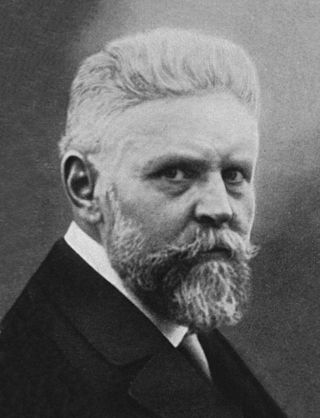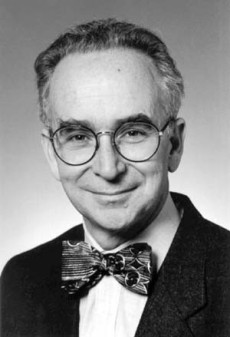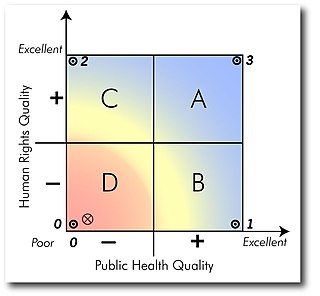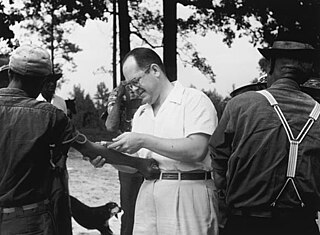The Nuremberg Code is a set of ethical research principles for human experimentation created by the court in U.S. v Brandt, one of the Subsequent Nuremberg trials that were held after the Second World War.
Bioethics is both a field of study and professional practice, interested in ethical issues related to health, including those emerging from advances in biology, medicine, and technologies. It proposes the discussion about moral discernment in society and it is often related to medical policy and practice, but also to broader questions as environment, well-being and public health. Bioethics is concerned with the ethical questions that arise in the relationships among life sciences, biotechnology, medicine, politics, law, theology and philosophy. It includes the study of values relating to primary care, other branches of medicine, ethical education in science, animal, and environmental ethics, and public health.
Medical ethics is an applied branch of ethics which analyzes the practice of clinical medicine and related scientific research. Medical ethics is based on a set of values that professionals can refer to in the case of any confusion or conflict. These values include the respect for autonomy, non-maleficence, beneficence, and justice. Such tenets may allow doctors, care providers, and families to create a treatment plan and work towards the same common goal. These four values are not ranked in order of importance or relevance and they all encompass values pertaining to medical ethics. However, a conflict may arise leading to the need for hierarchy in an ethical system, such that some moral elements overrule others with the purpose of applying the best moral judgement to a difficult medical situation. Medical ethics is particularly relevant in decisions regarding involuntary treatment and involuntary commitment.

The term racial hygiene was used to describe an approach to eugenics in the early 20th century, which found its most extensive implementation in Nazi Germany. It was marked by efforts to avoid miscegenation, analogous to an animal breeder seeking purebred animals. This was often motivated by the belief in the existence of a racial hierarchy and the related fear that "lower races" would "contaminate" a "higher" one. As with most eugenicists at the time, racial hygienists believed that the lack of eugenics would lead to rapid social degeneration, the decline of civilization by the spread of inferior characteristics.

Arthur L. Caplan is an American ethicist and professor of bioethics at New York University Grossman School of Medicine.

Jonathan Max Mann was an American physician who was an administrator for the World Health Organization, and spearheaded early AIDS research in the 1980s.

The Four-Step Impact Assessment is an academic framework initiated and published by Jonathan Mann and colleagues at the François-Xavier Bagnoud Center for Health and Human Rights at the Harvard School of Public Health. The assessment takes into account the negotiation of objectives between human rights and public health. Such an approach takes into account a measure of each discipline's respective overlap to expose infringement of goals. Such infringement or confluence can be mapped out in what Mann and colleagues proposed in a 2 by 2 table, as illustrated below.

The Hastings Center is an independent, nonpartisan bioethics research institute and think tank based in Garrison, New York. It was instrumental in establishing the field of bioethics and is among the most prestigious bioethics and health policy institutes in the world.

Henry Knowles Beecher was a pioneering American anesthesiologist, medical ethicist, and investigator of the placebo effect at Harvard Medical School.
Rosario Isasi is a health and human rights attorney, whose research and work focuses on the regulation of human genetic technologies.
In religion and ethics, the sanctity of life, sometimes described as the inviolability of life, is a principle of implied protection regarding aspects of sentient life that are said to be holy, sacred, or otherwise of such value that they are not to be violated. This can be applied to humans, animals or micro-organisms; for instance, in religions that practice Ahimsa, both are seen as holy and worthy of life. Sanctity of life sits at the centre of debate over abortion and euthanasia.
Jonathan D. Moreno is an American philosopher and historian who specializes in the intersection of bioethics, culture, science, and national security, and has published seminal works on the history, sociology and politics of biology and medicine. He is an elected member of the National Academy of Medicine.

Nazi human experimentation was a series of medical experiments on prisoners by Nazi Germany in its concentration camps mainly between 1942 and 1945. There were 15,754 documented victims, of various nationalities and age groups, although the true number is believed to be more extensive. Many survived, with a quarter of documented victims being killed. Survivors generally experienced severe permanent injuries.
Wendy K. Mariner is an American academic who is the Edward R. Utley Professor of Health Law, Bioethics & Human Rights in the Department of Health Law, Bioethics & Human Rights, at the Boston University School of Public Health. She is also a professor of law at Boston University School of Law and a professor of socio-medical sciences and community medicine at Boston University School of Medicine.
Ruth Macklin is an American philosopher and retired professor of bioethics.

Numerous experiments which are performed on human test subjects in the United States are considered unethical, because they are performed without the knowledge or informed consent of the test subjects. Such tests have been performed throughout American history, but some of them are ongoing. The experiments include the exposure of humans to many chemical and biological weapons, human radiation experiments, injections of toxic and radioactive chemicals, surgical experiments, interrogation and torture experiments, tests which involve mind-altering substances, and a wide variety of other experiments. Many of these tests are performed on children, the sick, and mentally disabled individuals, often under the guise of "medical treatment". In many of the studies, a large portion of the subjects were poor, racial minorities, or prisoners.
Human subject research legislation in the United States can be traced to the early 20th century. Human subject research in the United States was mostly unregulated until the 20th century, as it was throughout the world, until the establishment of various governmental and professional regulations and codes of ethics. Notable – and in some cases, notorious – human subject experiments performed in the US include the Tuskegee syphilis experiment, human radiation experiments, the Milgram obedience experiment and Stanford prison experiments and Project MKULTRA. With growing public awareness of such experimentation, and the evolution of professional ethical standards, such research became regulated by various legislation, most notably, those that introduced and then empowered the institutional review boards.
Michael Alan Grodin is Professor of Health Law, Bioethics, and Human Rights at the Boston University School of Public Health, where he has received the distinguished Faculty Career Award for Research and Scholarship, and 20 teaching awards, including the "Norman A. Scotch Award for Excellence in Teaching." He is also Professor of Family Medicine and Psychiatry at the Boston University School of Medicine. In addition, Dr. Grodin is the Director of the Project on Medicine and the Holocaust at the Elie Wiesel Center for Judaic Studies, and a member of the faculty of the Division of Religious and Theological Studies. He has been on the faculty at Boston University for 35 years. He completed his B.S. degree at the Massachusetts Institute of Technology, his M.D. degree from the Albert Einstein College of Medicine, and his postdoctoral and fellowship training at UCLA and Harvard University.

I. Glenn Cohen is a Canadian legal scholar and professor at Harvard Law School. He is also the director of Harvard Law School's Petrie-Flom Center for Health Law Policy, Biotechnology, and Bioethics.
The American Society of Law, Medicine and Ethics (ASLME) is a non-profit educational and professional organization. Based in Boston, Massachusetts, it is multidisciplinary in nature with members drawn from both the legal and medical professions. The society conducts research projects and conferences and publishes two journals, The Journal of Law, Medicine & Ethics and American Journal of Law & Medicine.








